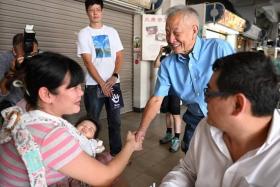Our President: To elect or not to elect?
The Constitutional Commission appointed to look into the elected presidency released its recommendations yesterday.
Go back to appointing a president instead of voting one in.
That was the suggestion made by the Constitutional Commission appointed to look into the elected presidency.
The elected presidency was introduced in 1991 after the need for a new role - help safeguard Singapore's financial reserves - was established.
In its report released yesterday, the nine-member Commission, led by Chief Justice Sundaresh Menon, suggested the two roles of the president - historical and custodial - could be separated.
Overseeing the nation's fiscal reserves and key public service appointments could be done by an appointed body of experts.
The appointed president will then be able to focus on his role as head of state.
APPOINT

THE REASONS
TENSION
The president's historical role as a symbol of the country's unity is based on being non-partisan.
But there may come a time when he has to confront the Government over the reserves. If he does, it creates conflict between his custodian and unifier roles.
DIVISIVE ELECTIONS
If you are going to stand up to the Government as president, you need to be elected to have the required legitimacy.
But this means you have to undergo an intensely political and potentially divisive election process.
A painful and divisive election where candidates attack each other on issues could hurt the potential winner's role as a symbol of national unity, the Commission noted.
ANTI-GOVERNMENT PLATFORM
The role of the elected president as a check on the Government incentivises candidates to campaign on an anti-Government platform, which is contrary to the president's unifying role.
It can also give rise to difficulties in the day-to-day business of governance, the Commission said.
The Government's ability to function pragmatically and plan for the nation's long-term good is vital to Singapore's success.
This is made possible only because the Government is willing and able to bear the political cost of making hard choices that are essential.
The Commission is concerned that a politicised president who campaigns on an anti-Government platform will clash with the Government over policies after being elected.
If the president is not elected, it will be difficult for him or her to disagree with a Government that is voted in. That was what Prime Minister Lee Hsien Loong pointed out in his letter to Chief Justice Sundaresh Menon.
ELECT

THE REASONS
POWER OF THE POLLS
In his letter, Mr Lee wrote: "While I appreciate the Commission's reasons for this suggestion (to appoint a president), as the Government has pointed out even when the scheme was first conceived, it would be difficult for a president to exercise custodial powers over the reserves and public service appointments, and veto proposals by the Government, without an electoral mandate."
Acting Prime Minister Teo Chee Hean echoed Mr Lee's views in a statement.
He said: "...it would be extremely difficult for a president, when exercising his custodial powers over the reserves and key public service appointments, to disagree with an elected Government, unless the president himself has the moral authority of an electoral mandate."
STABILISER
There are people who may think we do not need a safeguard and that Parliament can decide everything.
That was the case until the elected presidency was introduced in 1991, said Mr Lee in a televised interview on Sunday.
The idea is to have some other element in the Government. It could be an upper house, or a president who is separately elected with considerable powers and they divide the powers up.
He said: "You have a balancing system to stabilise the political system to make sure that you don't have one mishap and the whole boat flips over.
"And I think that for the long term, we need these stabilisers in our system, which is why we created the elected president."
SAFEGUARD
Mr Lee used Australia as an example in his interview.
He said its commodities boom turned elections into auctions.
He said: "...the opposition trying to come in would say, 'If I get elected, I will give you the following'.
"And you have healthcare pensions, you have school fees and all the rest of the good things and the government in position is under pressure to say, 'I will do as good and even better'."
Now, the commodities boom is over and Australia's budget is in deficit.
This has not happened in Singapore, Mr Lee pointed out.
"... Even the opposition knows that if they come in and they want to spend the money, they have to persuade the President and the President can say no," he said.
...While the prospect for such confrontation necessitates that the president hold the legitimacy and authority that comes from having an elected mandate, it seems out of place for persons seeking a non-partisan unifying office to have to go through a national election, which will likely be politicised and divisive.
- Constitutional Commission
The elected presidency was meant to be a safeguard and the electorate has been empowered to make those decisions. Citizens would definitely want to be able to exercise their choice as to who should be in this position.
- Dr Mathew Mathews, Senior Research Fellow at the Institute of Policy Studies
I don't think we will return to the days of appointing a president, because as intimated by the Prime Minister, the president has custodial powers which has to be commensurate with an electoral mandate granted by the people of Singapore. "
- Dr Mustafa Izzuddin, fellow at the Iseas - Yusof Ishak Institute
Get The New Paper on your phone with the free TNP app. Download from the Apple App Store or Google Play Store now



